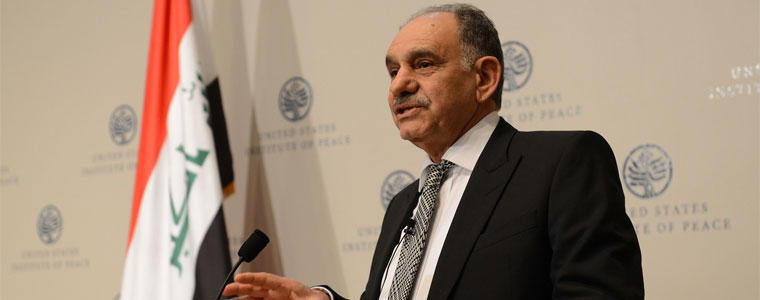Governance and Stability in Iraq
Remarks by Deputy Prime Minister H.E. Mr. Saleh al-Mutlaq and Discussions with Members of the Council of Representatives
Read the Event CoverageThe United States Institute of Peace (USIP), the National Defense University (NDU), and the Iraqi American Community Center (IAC) hosted H.E. Mr. Saleh al-Mutlaq, Deputy Prime Minister of the Republic of Iraq, and members of the Iraqi Council of Representatives for public remarks and a discussion on governance, services, transition, and peace and stability in Iraq.

Despite regional geopolitical tensions from Syria, high levels of violence, and political differences, Iraq has braved its external and internal obstacles to remain on course to hold its national elections scheduled for April 2014. Regardless of the outcome of the elections, the relationship between the federal, regional, and provincial levels and devolution of powers will remain at the core of Iraq’s politics, and with significant implications for governance, services, security, and overall peace and stability in the country.
Agenda
2:00pm to 3:15pm | Remarks by H.E. Mr. Saleh al-Mutlaq, Deputy Prime Minister of Iraq
- William B. Taylor, Opening Remarks
Vice President for Middle East and Africa, U.S. Institute of Peace - H.E. Mr. Saleh al-Mutlaq, Keynote Remarks
Deputy Prime Minister of the Republic of Iraq - Q&A Discussion
3:15pm to 3:30pm | Intermission
3:30pm to 5:00pm |Town Hall Discussion with Iraqi Members of Council of Representatives
- Sarhang Hamasaeed, Moderator
Senior Program Officer for the Middle East and Africa, U.S. Institute of Peace - Ezzat al-Shebander
Member of Council of Representatives - Nada al-Juburi
Member of Council of Representatives
This event was hosted jointly by the U.S. Institute of Peace, the National Defense University, and the Iraqi American Community Center.



